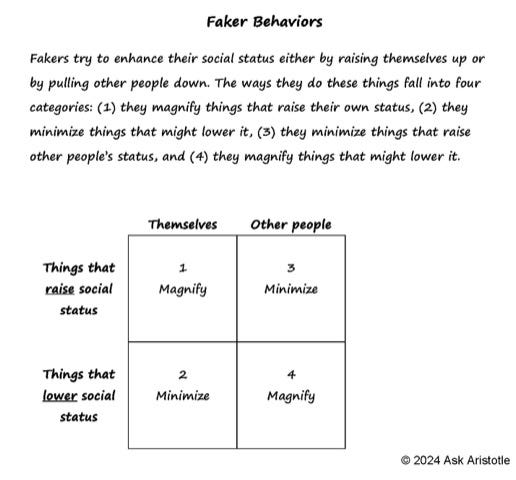Faker Flunkies
Fakers often surround themselves with a posse of flunkies who are willing to go along with whatever they think, or say, or do.
Vishal: There’s something else I’ve noticed. I’m wondering whether it fits into the faker framework you’ve been describing.
Bill: What’s that?
Vishal: Sometimes fakers are surrounded by people who actually believe in them—like in the movie Mean Girls. The main mean girl has a posse of other girls who always follow her around and do what she wants.
Bill: Yes, that behavior fits into the faker framework. Fakers often surround themselves with a posse of people who are willing to go along with whatever they think, or say, or do: yes-men, sycophants, or flunkies. Even if fakers fail to get the admiration and respect of other people, they can rely on getting admiration and respect from their flunkies (or at least a simulation of admiration and respect).
Vishal: Why do you say “simulation”?
Bill: Sometimes faker flunkies are themselves fakers. They misrepresent their own thoughts and feelings. They want to be around the faker because they think the faker can get them something they want—some type of social status, for instance. So they pretend to admire and respect the faker, but in reality, they resent the faker in the same way the faker resents real masters.
Vishal: Do flunkies do anything else for fakers?
Bill: Two things:
First, they give fakers an inventory of people to blame when the faker fails or makes a mistake.
Second, they give fakers an audience in front of whom the faker can mock or criticize people whose social status the faker wants to lower.
Vishal: Can you tell me more?
Bill: Sure. I mentioned before that fakers see blame as a threat to their social status. So they try to avoid blame by placing it somewhere else—often on other people. Their flunkies provide convenient targets.
Vishal: What about the final flunky function you mentioned: giving fakers an audience?
Bill: Fakers want to occupy a high place in the social hierarchy. That can happen either by raising themselves up or by pulling other people down. As a result, fakers treat other people’s successes and failures in ways that are equal and opposite the ways they treat their own. If fakers exaggerate their own accomplishments, they diminish other people’s. If fakers minimize their own shortcomings and failures, they magnify other people’s. If they avoid blaming themselves, they assign blame to others. If they promote the value of the things they know about, they mock or denigrate the things other people do. The many ways that fakers try to pull other people down are included in categories (3) and (4) of the faker behavior matrix we described earlier:
Vishal: Sure, I remember that.
Bill: Some of the ways fakers pull other people down require an audience. They need someone to witness their mockery and denigration of others. They need someone to hear their gibes and criticisms. They need someone to go along with them so they can feel like they’re succeeding in pulling other people down. Faker flunkies provide fakers with the audience they need.
To be continued…




